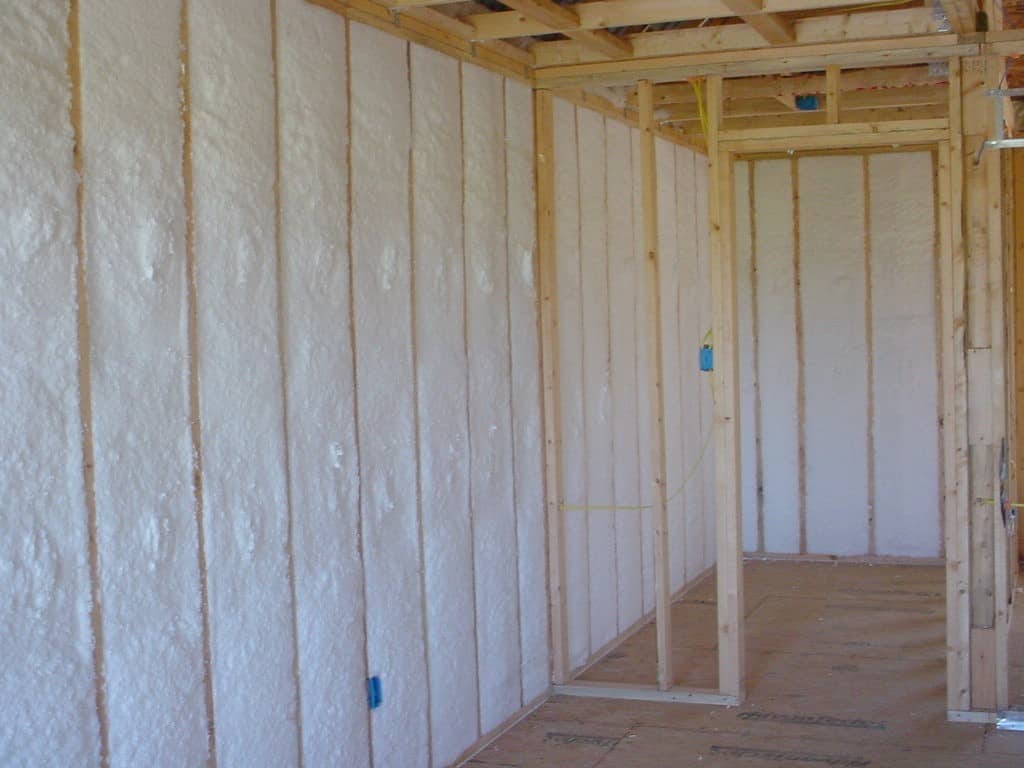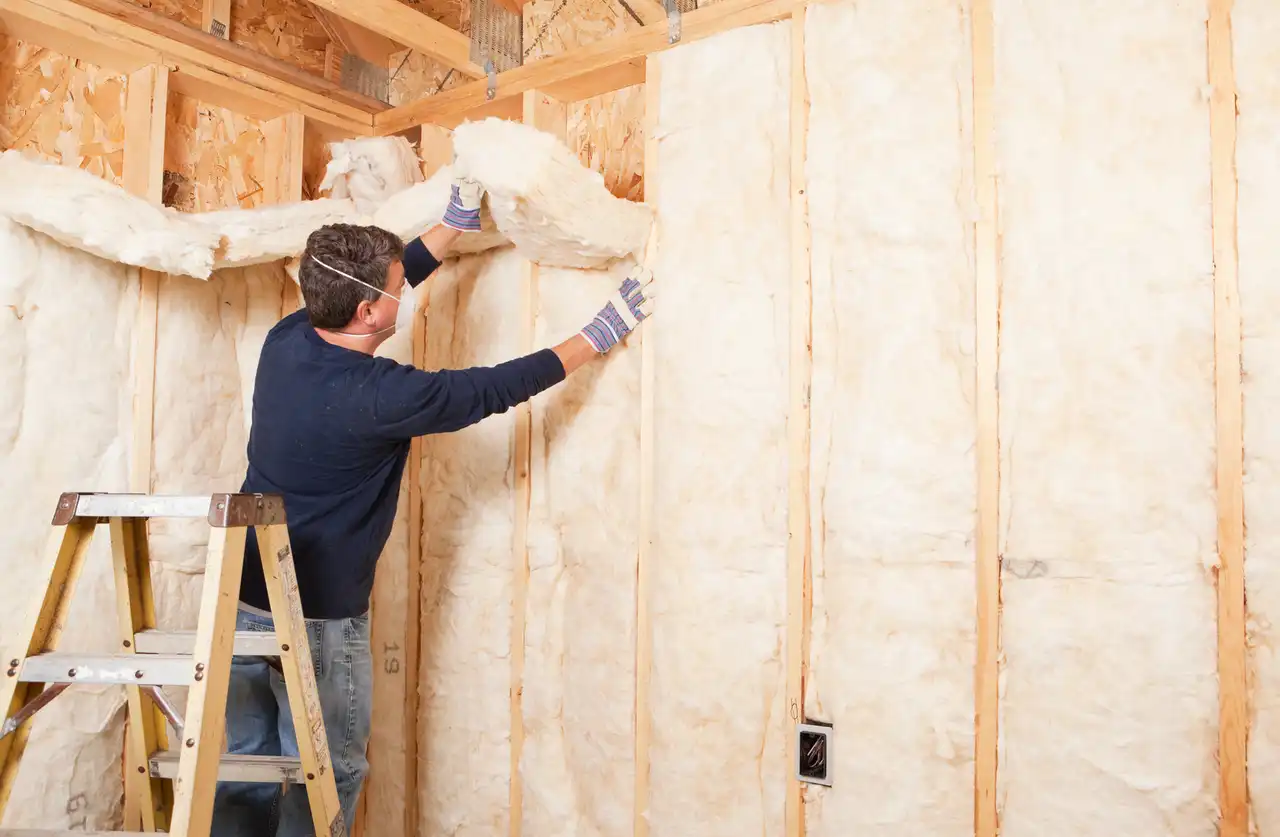Wall insulation delivers multiple critical benefits for Decatur homes, including reduced energy costs of 15-30%, enhanced indoor comfort through consistent temperatures, improved soundproofing against neighborhood noise, and increased property value. This essential building component creates a thermal barrier that keeps homes warmer in winter and cooler in summer while reducing the workload on heating and cooling systems.
Decatur’s varied climate, with hot humid summers and occasionally cold winters, makes proper wall insulation particularly valuable for local homeowners. Without adequate insulation, homes waste energy, create uncomfortable living environments, and may develop moisture-related problems that affect indoor air quality and structural integrity. Let’s explore the specific advantages wall insulation provides and which solutions work best for Decatur’s unique conditions.
Energy Efficiency Benefits
Proper wall insulation significantly reduces energy consumption by preventing heat transfer through your home’s exterior walls.
In a typical Decatur home, walls account for 30-35% of heat loss in winter and heat gain in summer. Quality insulation creates resistance to this heat flow (measured as R-value), directly reducing the energy needed to maintain comfortable temperatures.
According to the Department of Energy, properly insulated walls can reduce heating and cooling costs by 15-30% compared to under-insulated homes. For an average Decatur household spending $2,000 annually on heating and cooling, this translates to potential savings of $300-$600 per year.
Bonus Tip: The effectiveness of your wall insulation works hand-in-hand with air sealing. Even small gaps around electrical outlets, window frames, and plumbing penetrations can reduce insulation performance by 30%. Consider a comprehensive approach that addresses both insulation and air leakage.
Comfort Enhancement
Beyond energy savings, wall insulation dramatically improves the everyday comfort of your home:
Temperature Stability
Insulated walls maintain more consistent temperatures throughout living spaces, eliminating the common problem of rooms that feel too hot or too cold compared to the rest of your home. This stability means fewer thermostat adjustments and more comfortable living conditions.
Draft Elimination
Many comfort complaints stem from air movement rather than actual temperature issues. Proper wall insulation, particularly when paired with air sealing, eliminates the drafts that make rooms feel colder than they actually are, creating a noticeably more comfortable environment.
Surface Temperature Regulation
In under-insulated homes, interior wall surfaces can be significantly colder than room air in winter, creating radiant discomfort even when thermostats show appropriate readings. Quality insulation brings wall surface temperatures closer to room air temperature, eliminating this often-overlooked source of discomfort.
Sound Control Benefits
Wall insulation provides significant acoustic benefits for Decatur homes located in busy neighborhoods or near traffic:
External Noise Reduction
Properly insulated walls can reduce outside noise penetration by 20-30 decibels, transforming the indoor environment, especially in homes near busy streets, commercial areas, or Decatur’s growing urban centers.
Internal Sound Management
Insulation between interior walls improves room-to-room privacy and reduces sound transmission, creating more peaceful living environments, particularly valuable for home offices, bedrooms, and entertainment spaces.
According to industry research, enhanced soundproofing ranks among the top three unexpected benefits homeowners report after upgrading their wall insulation.
Wall Insulation Options for Decatur Homes
Different insulation materials offer varying benefits depending on your specific home construction and needs.
| Insulation Type | R-Value Per Inch | Key Benefits | Best Applications | Cost Range |
|---|---|---|---|---|
| Fiberglass Batts | 3.1-4.3 | Affordable, wide availability | New construction, accessible wall cavities | $ |
| Blown-in Cellulose | 3.2-3.8 | Excellent for retrofits, good sound control | Existing walls, attics | $$ |
| Spray Foam (Open Cell) | 3.5-3.7 | Superior air sealing, good sound blocking | Irregular spaces, new construction | $$$ |
| Spray Foam (Closed Cell) | 6.0-7.0 | Highest R-value, moisture barrier | Moisture-prone areas, maximum performance needs | $$$$ |
| Rigid Foam Board | 4.0-6.5 | Good for external applications | Basement walls, exterior retrofits | $$$ |
Bonus Tip: For existing Decatur homes, blown-in cellulose often provides the best combination of performance and value, as it can be added to finished walls through small access holes without major renovation.
Moisture Control and Protection
In Decatur’s humid climate, wall insulation plays a crucial role in moisture management:
Condensation Prevention
Proper insulation keeps interior wall surfaces warmer, preventing them from reaching the dew point where condensation forms. This reduces the risk of hidden moisture problems that can lead to mold growth and structural damage.
Vapor Management
Quality insulation systems in Decatur include proper vapor control layers that prevent moisture from migrating through walls while still allowing any trapped moisture to escape. This balance is particularly important in Decatur’s mixed climate with both heating and cooling seasons.
Long-term Structural Protection
By managing temperature and moisture conditions within wall assemblies, proper insulation helps protect structural components from moisture-related damage, extending the life of your home and preventing costly repairs.
Wall Insulation Technical Specifications
Understanding technical requirements helps ensure your insulation meets local needs and building codes:
| Wall Location | Recommended R-Value (Decatur Climate) | Minimum Code Requirement | Optimal Thickness | Vapor Barrier Needs |
|---|---|---|---|---|
| Exterior Walls (Wood Frame) | R-13 to R-21 | R-13 | 3.5″-5.5″ | Climate-specific |
| Exterior Walls (Masonry) | R-10 to R-15 | R-8 | 2″-3″ | Required in most cases |
| Basement Walls | R-13 to R-19 | R-10 continuous | 2″-5″ | Required |
| Interior Walls (For Sound) | R-11 to R-13 | Not required | 3.5″ | Not needed |
Georgia building codes require minimum R-13 insulation for wood-frame walls in new construction, though higher values deliver superior performance and additional benefits.
Things to Consider Before Making a Decision
Before investing in wall insulation, evaluate these important factors:
Home Age and Construction Type
Older Decatur homes (pre-1980) often have minimal existing insulation and different wall construction than newer builds. Your home’s specific construction affects which insulation solutions work best and how they should be installed.
Current Performance Issues
Identify specific problems you want to address. Are high energy bills your main concern? Temperature inconsistency? Noise? Moisture issues? Understanding your priorities helps target solutions effectively.
Budget and Long-Term Plans
More effective insulation generally costs more upfront but delivers greater long-term benefits. Consider how long you plan to stay in your home when choosing between good, better, and best insulation options.
Installation Approach
For existing homes, insulation can be added through various methods:
- Blown-in installation through small access holes
- Interior renovation with wall cavity access
- Exterior renovation with removal of siding
- Combination approaches targeting problem areas

Each method offers different combinations of performance, disruption, and cost.
Common Questions About Wall Insulation
Here are answers to questions Decatur homeowners frequently ask about wall insulation:
How do I know if my walls need more insulation?
Several signs suggest insufficient wall insulation:
- High energy bills compared to similar homes
- Walls that feel cold to the touch in winter
- Uneven temperatures between rooms
- Excessive noise from outside
- Ice dams forming on roof edges in winter
A professional energy assessment with thermal imaging can definitively identify insulation gaps.
Can I install wall insulation myself?
Some types like fiberglass batts can be DIY-installed in accessible areas during renovation. However, adding insulation to existing finished walls generally requires specialized equipment and professional installation for optimal performance.
Will adding wall insulation create moisture problems?
Properly installed insulation with appropriate vapor management prevents moisture issues. Professional installers account for Decatur’s climate to ensure the insulation system manages moisture effectively.
How long does wall insulation last?
Quality wall insulation typically lasts for decades. Fiberglass and cellulose generally perform effectively for 20-30+ years, while spray foam can last the lifetime of the structure when properly installed.
FAQ: Wall Insulation Benefits
What is the typical return on investment for wall insulation in Decatur? Wall insulation typically provides a return on investment of 70-95% in home value, plus ongoing energy savings. Most homeowners recover their investment through energy savings within 3-7 years, depending on existing insulation levels and energy costs.
Does wall insulation help with allergies and indoor air quality? Yes. By reducing air infiltration through walls, proper insulation helps prevent outdoor allergens, pollutants, and humidity from entering your home. This creates a more controlled indoor environment that can significantly benefit allergy sufferers.
Should I insulate interior walls too? While not necessary for energy efficiency, insulating interior walls provides excellent sound control benefits. This is particularly valuable between bedrooms, bathrooms, home offices, and entertainment rooms where noise privacy is desired.
Will wall insulation make my home too airtight? Modern homes benefit from being airtight with controlled ventilation rather than relying on random air leaks for fresh air. If your home becomes significantly more airtight after insulation, consider having your ventilation assessed to ensure healthy indoor air quality.
How does wall insulation compare to other energy upgrades? Wall insulation typically provides a better return on investment than window replacement and comparable returns to attic insulation. When combined with air sealing, wall insulation ranks among the most cost-effective energy improvements for most Decatur homes.
Ready to Improve Your Decatur Home’s Efficiency and Comfort?
Wall insulation delivers multiple valuable benefits for Decatur homeowners, from significant energy savings to enhanced comfort, better soundproofing, and increased property value. With proper installation and materials matched to your specific home needs, wall insulation provides one of the best returns on investment among home improvement projects.
Take the next step toward a more efficient, comfortable home by scheduling a professional wall insulation assessment. Makeover Insulation’s experts can evaluate your specific needs and recommend the most effective solution for your Decatur home.
Contact Makeover Insulation at (470) 664-5300 or email [email protected] to schedule your comprehensive home assessment today.
Reviewer:
Ava Clark shared her input based on 6 years of working with spray foam insulation teams. Her focus on customer trust and communication helped shape key parts of this post.










